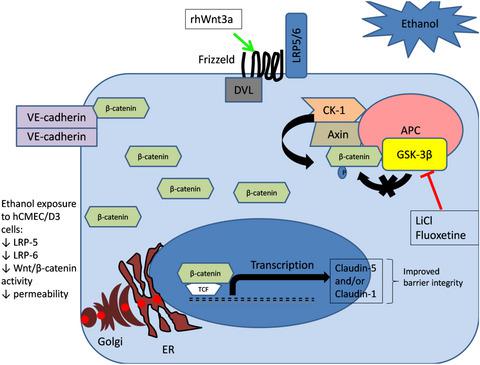当前位置:
X-MOL 学术
›
J. Neurochem.
›
论文详情
Our official English website, www.x-mol.net, welcomes your
feedback! (Note: you will need to create a separate account there.)
Impact of Wnt/β-catenin signaling on ethanol-induced changes in brain endothelial cell permeability
Journal of Neurochemistry ( IF 4.2 ) Pub Date : 2020-09-30 , DOI: 10.1111/jnc.15203 Marlyn D Laksitorini 1, 2 , Vinith Yathindranath 1 , Wei Xiong 1 , Fiona E Parkinson 1 , James A Thliveris 3 , Donald W Miller 1, 4, 5
Journal of Neurochemistry ( IF 4.2 ) Pub Date : 2020-09-30 , DOI: 10.1111/jnc.15203 Marlyn D Laksitorini 1, 2 , Vinith Yathindranath 1 , Wei Xiong 1 , Fiona E Parkinson 1 , James A Thliveris 3 , Donald W Miller 1, 4, 5
Affiliation

|
Chronic exposure to ethanol is associated with enhanced leakiness in the brain microvessel endothelial cells that form the blood–brain barrier (BBB). As previous studies suggested Wnt/β-catenin signaling could improve the BBB phenotype of brain endothelial cells, we examined the extent to which Wnt signaling is altered following ethanol exposure, using both a cell culture model of the BBB and mice exposed to ethanol, and the ability of Wnt activation to reverse the permeability effects of ethanol. The human brain endothelial cells, hCMEC/D3, were exposed to ethanol (17–200 mM) for various periods of time (0–96 hr) and Wnt signaling, as well as expression of downstream genes influencing BBB integrity in the cell monolayers were monitored. Determination of Wnt signaling in both brain homogenates and brain microvessels from mice exposed to ethanol was also performed. The effects of ethanol on the permeability of the hCMEC/D3 monolayers were examined using both small molecular weight (sodium fluorescein) and large molecular weight (IRdye 800CW PEG) fluorescent markers. Exposure of hCMEC/D3 to ethanol (50 mM) caused a down-regulation of Wnt/β-catenin signaling, a reduction of tight junction protein expression and up-regulation of plasmalemma vesicle associated protein (PLVAP). A similar reduction in Wnt/β-catenin activity in both cortical brain homogenates and isolated cortical cerebral microvessels were observed in mice. Other areas such as cerebellum and striatum displayed as much as 3–6 fold increases in Dkk-1, an endogenous Wnt inhibitor. Ethanol exposure caused significant changes in both sodium fluorescein and IRdye 800CW PEG permeability (2-fold compared to control). The ethanol-induced increases in permeability were attenuated by treatment with known Wnt activators (i.e. LiCl or Wnt3a). Additional screens of CNS active agents with possible Wnt activity indicated fluoxetine could also prevent the permeability effects of ethanol. These studies suggest that ethanol-induced changes in brain microvessel permeability can be reversed through activation of Wnt signaling.
中文翻译:

Wnt/β-连环蛋白信号对乙醇诱导的脑内皮细胞通透性变化的影响
长期接触乙醇与形成血脑屏障(BBB)的脑微血管内皮细胞的渗漏增强有关。正如之前的研究表明 Wnt/β-连环蛋白信号传导可以改善脑内皮细胞的 BBB 表型一样,我们使用 BBB 细胞培养模型和暴露于乙醇的小鼠检查了乙醇暴露后 Wnt 信号传导的改变程度,以及Wnt 激活逆转乙醇渗透性影响的能力。将人脑内皮细胞 hCMEC/D3 暴露于乙醇 (17–200 mM) 不同时间段(0–96 小时),并检测 Wnt 信号传导以及影响细胞单层中 BBB 完整性的下游基因的表达。被监控。还测定了暴露于乙醇的小鼠的脑匀浆和脑微血管中的 Wnt 信号传导。使用小分子量(荧光素钠)和大分子量(IRdye 800CW PEG)荧光标记检查乙醇对 hCMEC/D3 单层渗透性的影响。将 hCMEC/D3 暴露于乙醇 (50 mM) 会导致 Wnt/β-连环蛋白信号传导下调、紧密连接蛋白表达减少以及质膜囊泡相关蛋白 (PLVAP) 上调。在小鼠皮质脑匀浆和分离的皮质脑微血管中观察到 Wnt/β-连环蛋白活性的类似降低。小脑和纹状体等其他区域的 Dkk-1(一种内源性 Wnt 抑制剂)含量增加了 3-6 倍。乙醇暴露导致荧光素钠和 IRdye 800CW PEG 渗透性发生显着变化(与对照相比为 2 倍)。 用已知的 Wnt 激活剂(即 LiCl 或 Wnt3a)处理可以减弱乙醇引起的通透性增加。对可能具有 Wnt 活性的 CNS 活性剂的额外筛选表明氟西汀也可以防止乙醇的渗透性影响。这些研究表明,乙醇引起的脑微血管通透性变化可以通过激活 Wnt 信号传导来逆转。
更新日期:2020-09-30
中文翻译:

Wnt/β-连环蛋白信号对乙醇诱导的脑内皮细胞通透性变化的影响
长期接触乙醇与形成血脑屏障(BBB)的脑微血管内皮细胞的渗漏增强有关。正如之前的研究表明 Wnt/β-连环蛋白信号传导可以改善脑内皮细胞的 BBB 表型一样,我们使用 BBB 细胞培养模型和暴露于乙醇的小鼠检查了乙醇暴露后 Wnt 信号传导的改变程度,以及Wnt 激活逆转乙醇渗透性影响的能力。将人脑内皮细胞 hCMEC/D3 暴露于乙醇 (17–200 mM) 不同时间段(0–96 小时),并检测 Wnt 信号传导以及影响细胞单层中 BBB 完整性的下游基因的表达。被监控。还测定了暴露于乙醇的小鼠的脑匀浆和脑微血管中的 Wnt 信号传导。使用小分子量(荧光素钠)和大分子量(IRdye 800CW PEG)荧光标记检查乙醇对 hCMEC/D3 单层渗透性的影响。将 hCMEC/D3 暴露于乙醇 (50 mM) 会导致 Wnt/β-连环蛋白信号传导下调、紧密连接蛋白表达减少以及质膜囊泡相关蛋白 (PLVAP) 上调。在小鼠皮质脑匀浆和分离的皮质脑微血管中观察到 Wnt/β-连环蛋白活性的类似降低。小脑和纹状体等其他区域的 Dkk-1(一种内源性 Wnt 抑制剂)含量增加了 3-6 倍。乙醇暴露导致荧光素钠和 IRdye 800CW PEG 渗透性发生显着变化(与对照相比为 2 倍)。 用已知的 Wnt 激活剂(即 LiCl 或 Wnt3a)处理可以减弱乙醇引起的通透性增加。对可能具有 Wnt 活性的 CNS 活性剂的额外筛选表明氟西汀也可以防止乙醇的渗透性影响。这些研究表明,乙醇引起的脑微血管通透性变化可以通过激活 Wnt 信号传导来逆转。











































 京公网安备 11010802027423号
京公网安备 11010802027423号